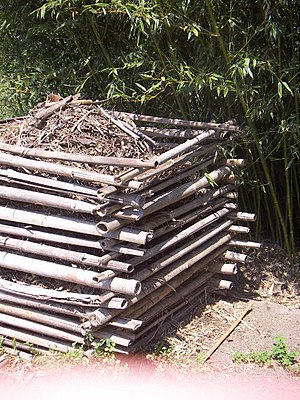If you've been reading this blog for a while, and gardening for some time, you may think you've learned everything there is to know about all the things you can do in your garden in the fall, to prepare both the soil and any remaining plants for the winter. You can seed, you can mulch, you can even plant some things now instead of waiting until the spring. You've got a whole big list. However, suddenly you realize that you've had a very long summer of constant gardening work and maybe, like the garden itself, you'd really, really like a break. So what are the things you can skimp on, without putting the garden in jeopardy?
|
|
| Vegetable plot in winter. (Photo credit: Wikipedia) |
First of all, you don't actually have to remove all the dead plants if you don't want to. If you have any diseased plants, of course you don't have a choice with those. If you leave those there, they can break down and affect the soil, and give you some very big headaches in the spring. You also don't want to put any diseased plant material into the compost bin over the winter, because it will infect the entire batch of compost and spread disease to all the plants you use it on. Take diseased material and simply throw it away or burn it.
But something like annuals that have been healthy and are now fading away can be left out in your garden over the winter. First of all, they will maintain the appearance of having some vegetation still in the garden for a while. The remnants of ornamental grasses or hostas coming up out of the snow can be very attractive. And after they've broken down over the winter, most of the time you should be able just to turn them into the soil, and they will be one element of your spring compost.
You also don't need to mulch every remaining plant in your garden over the winter. Yes, if you have some that are a little delicate, you should definitely mulch those. The purpose of the mulch is to preserve moisture so the plants don't dry out in the winter air, and to keep an even temperature in the ground around them. So some plants will still need mulching, to give them some extra protection during the winter months. But for other more hardy plants, you can skip the mulching.
|
|
| Garden Compost bin made of Bamboo canes. (Photo credit: Wikipedia) |
Something you should think twice about doing, although this won't necessarily save you work, is wrapping many of your plants in burlap. If you wrap your plants this way, you could actually end up trapping ice inside the burlap and against the surface of the plants. What many gardeners are now advising is that rather than wrapping in burlap to protect plants against things like cold winds, set up stakes all around each plant and wrap the burlap around the entire enclosure instead. This will serve the same purpose, but allow some breathing room for the limbs of the plants as well.
It's a lot of work preparing a garden in the spring as well as cleaning it up in the fall. It's true, of course, that whatever you leave undone in the autumn will have to be done in the spring instead, so you're not exactly saving yourself the work. However, it's also true that the spring arouses new energy, and people often feel much more ready to get a lot done. So if you're tired at the end of the growing season, and really just want to be done with it all, do just the absolutely necessary cleanup and let everything else go for the winter. Put your feet up, enjoy your well deserved rest, and start recharging your energies for a fresh start in spring.



No comments:
Post a Comment